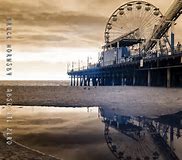Liverpool Sound and Vision Rating 8.5/10
The minimum value is not an accusation or deriding comment one can place at the door of Bruce Hornsby, quite the opposite in face, his energy and perspective across the decades has endeared him to more than one genre of fans, the melodic Rock, film score, musical and the cool sensation of sincere Jazz effect, all have rippled under the weight of dynamic prose and observance of life through the speciality of piano and keys, of lofty ideals and the slow dance with the eagerly devoured, Absolute Zero is a place that is the complete opposite to which the music provided in Bruce Hornsby’s latest solo album regales itself upon the hearts of the listener.
Whilst the album itself is hungry for the delicate nature of sincere exploration across the genres he has held up as a gift, it is perhaps within the shining light of this new found continent of music that Bruce Hornsby might well be found to have found the moment in which to step away from the hits that have been surrounding himself since the first album with The Range, a definitive trail found that always seems to haunt musicians who wish to explore their own conscious mind and who are always pulled back, mainly due to the exploitation of memory that comes with music video and the less than dedicated fan who never move away from a specific moment in time.
Absolute Zero has within its musical seams an almost invisible thread that owes much to the artistry of performers such Peter Gabriel, a state of entropy smashed apart and made to repent in a pursuit of evaluation, evolving panoramic consideration which progressing and scales a new set of imposed rules with a style that ushers in a new sense of respect for the music of the man at hand.
Across songs such as the superbly imagined Fractals, Never In This House, Voyager One, the muscular divine that weeps beautifully within The Blinding Light of Dreams and White Noise, Bruce Hornsby’s willingness to go deeper, to explore with ever demanding thoughtfulness, is on show perfectly. A willingness to frame one’s own destination without the aid of a map, just imagination, is to be congratulated, and in Absolute Zero all that matters is the lesson that to venture nothing is to gain certainty, to explore all is to revel in the marvel of the unknown.
Ian D. Hall
